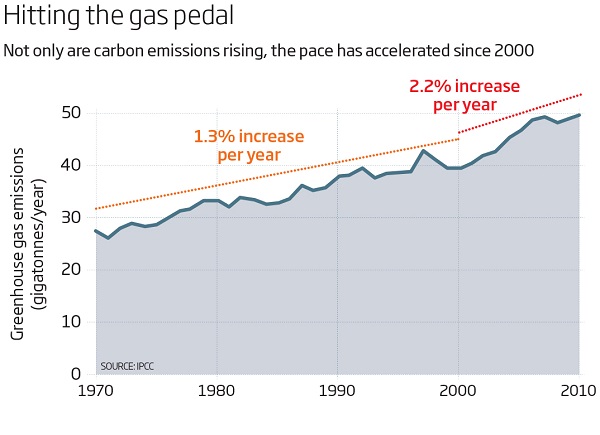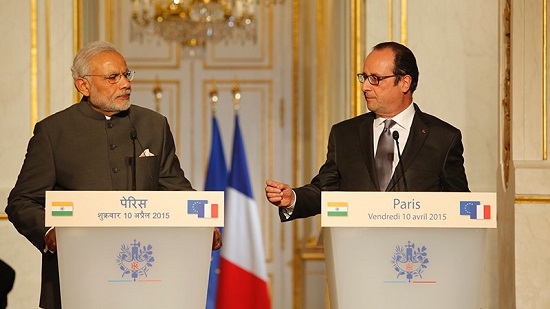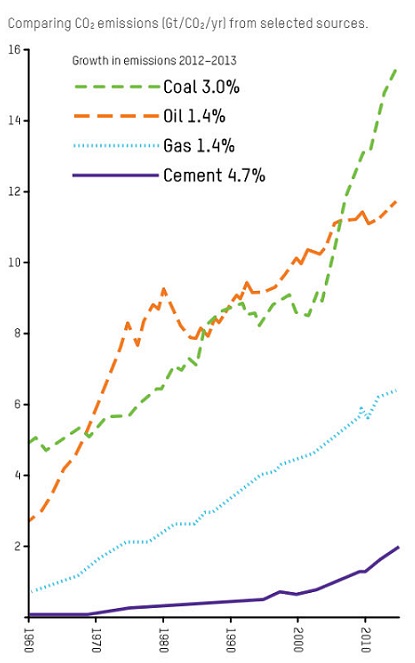French President Francois Hollande did not turn up to give the opening address at a major climate science conference in Paris recently, being otherwise occupied with questions concerning Grexit. Had he been there he may have been able to explain why France has restored subsidies to the French companies building coal-fired power stations in other countries.
As the matter stands, we are told, a coal renaissance is underway which will deliver a 4°C world, or warmer.
The conference had 2000 delegates from 100 countries, and ran with four streams over four days with the title Our Common Future Under Climate Change. Summaries of many of the conference presentations can be accessed via the conference blog.
Economist Ottmar Edenhofer of the Potsdam Institute for Climate Impact Research in Germany told the conference “Without carbon pricing, I have serious doubts that we can deal with the renaissance of coal.”
“Emissions are rising and rising,” he said. “Instead of decarbonising, we are carbonising our economy.”
This is the graph of emissions trends:

Emissions reductions were being achieved in some countries, mainly by switching to gas, but this pushed cheap coal onto the market which was being taken up elsewhere.
Some at the conference said that the UN’s entire approach is flawed.
- Trying to get an effective global agreement on cutting emissions is not possible, they say. “Game theory tells you this will fail,” Gjalt Huppes of Leiden University in the Netherlands told New Scientist.
Instead, every country should put a price on carbon that is high enough to kill first coal, then oil and gas. This could be done by two or three of China, the US, the EU or Japan pricing carbon appropriately and then charging tariffs on goods produced elsewhere.
The dirty secret of 2°C scenarios, the NS article says, is that they require “negative emissions” and we don’t know whether that would ever work on the scale required to make a difference.
The Scientific Committee of the conference issued a statement, carefully worded, but warning at the end of a risk of 4°C scenarios and “impacts that are severe, pervasive, and irreversible.”
Then on 21 July there was a World Summit of Conscience, where Hollande told representatives of world faiths that 80% of fossil fuels must stay in the ground.

According to this report the conference was used to “to launch a new organisation called ‘Green Faith in Action’, aimed at raising awareness about environmental and sustainable development issues among adherents of different religions.”
As they spoke:
- another conference on the climate was taking place – at the Vatican, with the mayors of about 60 cities meeting with Pope Francis to formulate a pledge on combating greenhouse gas emissions.
According to this report there was yet another meeting going on in Paris, of some 40 foreign and environment ministers “to accelerate flagging UN negotiations”. Also on the same day:
- 24 of Britain’s top academic and professional bodies issued a dire warning of pending climate catastrophe.
For a reasonable chance of staying under 2C, they said in a joint statement, “we must transition to a zero-carbon world by early in the second half of the century”.
That’s quite a lot of talk. Then France introduced a law to transform its energy sector:
- The long-anticipated law will halve the country’s energy consumption by 2050, cut nuclear power production by a third by 2025 (from 75 percent of electricity mix to 50 percent), and increase renewable energy to 32 percent of total energy consumption by 2030. It also requires France to reduce carbon emissions by 40 percent by 2030 compared with 1990 levels, in part by reducing fossil fuel consumption by 30 percent in 2030 compared with 2012.
Also:
- France introduced its domestic carbon tax in 2014 to cover companies not regulated by the E.U. Emissions Trading Scheme (ETS), including those consuming natural gas, heating oil, and coal. The tax later expanded to fuels including gasoline and diesel. Originally, it started at 7 ($7.69) euros/metric ton.
They are expecting to create 100,000 jobs in the green sector in the next three years.
They are claiming that “It’s the most advanced law of its kind among industrial countries.” Certainly the Brits are heading in the opposite direction:
- Across the channel on Wednesday, the British government made a controversial move in seemingly the opposite direction of France by announcing plans to curb subsidies for renewable forms of energy like small solar projects and biomass generators. The plan comes weeks after the newly re-elected Liberal Prime Minister David Cameron’s government said it would also discontinue onshore wind farm subsidies next year.
Update: The “renaissance of coal” arguments by Ottmar Edenhofer and others were not supported by statistics. Oxfam has recently issued a report Powering up against poverty: Why renewable energy is the future. Oxfam gives the impression that renewables are rapidly taking over from coal, especially in rural areas beyond the grid. Yet the report contains this graph of emissions from fossil fuels, at least up until 2013:

According to the report coal consumption peaked in China in 2014, when it fell by 2.9%. If it doesn’t peak globally soon, however, we are in trouble.


Hi Brian, did you see this report mentioned in the Guardian today suggesting big polluters will be able to increase their emissions under Direct Action?
It’s mentioned in there that Xenophon feels betrayed or some such thing, he was told the safeguards would have real force, blah, blah, blah. Why would he ever have believed such a thing?
Sorry bit confusing there – link in my last was for Guardian article, here’s a summary of the actual findings
Thanks, Val. Your second link is broken, but I get the message from the article.
Disgraceful, really.
***RepuTex analysis and indices do not constitute investment recommendations and are not a recommendation to buy, sell or hold shares or securities issued.
RepuTex disclaims any and all liability relating to these materials and makes no express or implied representations or warranties concerning the accuracy or completeness of information.
In particular it does not warrant or represent that the information is accurate, up-to-date, comprehensive, verified or complete. RepuTex does not accept liability for any error, omission or delay in the information or for any reliance placed by any person on the information. RepuTex shall not be liable for any claims or losses of any nature, arising indirectly or directly from use of the information, howsoever arising.
Not very sure of their work, are they Lenore ?
Here’s the full link Brian, hopefully it works – doesn’t say much more than the article though http://www.reputex.com/publications/market-update/update-reviewing-the-safeguard-market-toothless-tigeror-hidden-dragon/
Yes, it works, thanks, Val.
Jumpy, perhaps they have been sued!